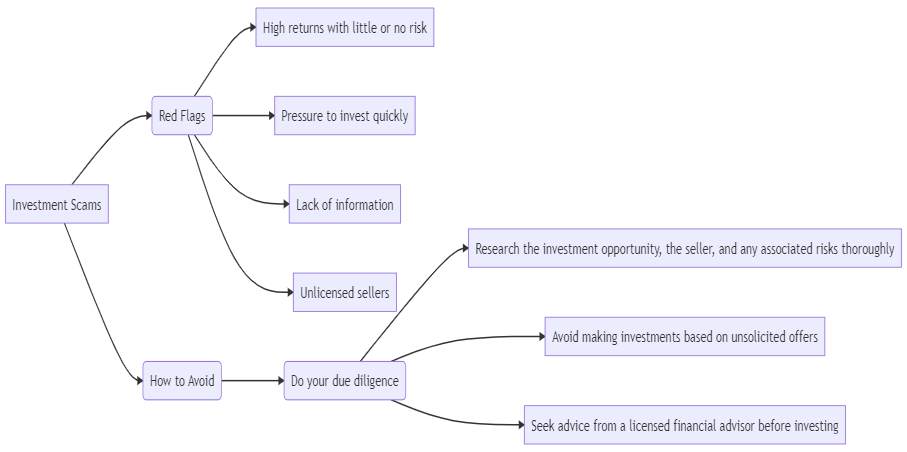
At David T Rosen, we understand how important it is for individuals to protect their hard-earned money with real money for real investment, only for a good investment. That’s why we want to share valuable information about common investment scams and how to avoid them.
Investment scams and fraud can come in many different forms, but they all share the promise of high returns and money with little to no risk. These scams often target vulnerable individuals, such as the elderly or those unfamiliar with investing their money. They can be compelling and lead to significant financial losses for companies and potential victims.
Types of Investment Scams
There are several more money types of money, stock, and investment fraud scams to be aware of, including:
- Ponzi Schemes: This type of scam involves a fraudulent investment scheme where returns are paid to earlier investors using new investors’ capital. These scams eventually collapse, leaving most investors with significant losses.
- Pyramid Schemes: Like Ponzi schemes, pyramid schemes rely on new investors to generate returns for earlier investors. The difference is that pyramid schemes often require individuals to recruit others to join the system to make money.
- Advance Fee Scams: These scams require individuals to pay upfront fees to access investment opportunities that promise high returns. These opportunities do not usually exist, and investors lose their money.
- Boiler Room Scams: In these scams, high-pressure sales tactics convince individuals to invest in worthless or non-existent securities.

How to Avoid Investment Scams
There are several steps you can take not to lose money and avoid the low risk of your cash falling victim to investment scams:
- Research Before You Invest: Always research the investment opportunity and the company offering it before investing any money. Check if the company is registered with relevant authorities and if the investment is authorized for sale.
- Be Wary of High Returns: If an investment opportunity promises high returns with little risk, it is likely a scam. Remember, no investment is entirely risk-free.
- Watch Out for Pressure Tactics: Scammers often use high-pressure sales tactics to convince individuals to invest quickly. Don’t let anyone pressure you into making a hasty decision.
- Don’t Give Out Personal Information: Scammers may ask for personal information, such as your Social Security number, to steal your identity. Never give out personal information to someone you do not know and trust.
- Seek Professional Advice: If you are unsure about an investment opportunity, seek advice from a professional financial advisor before investing money.
Investing is one of the most popular ways to grow wealth, but not without risks. Unfortunately, investment scams are on the rise and can be devastating for unsuspecting investors. At David T Rosen, we take investment and investor education very seriously and believe in the power of informed decision-making. This article will delve into investment scams and how you can avoid falling victim to them.
What are Investment Scams?
Investment scams are fraudulent schemes that promise high returns with little or no risk. Scammers in investment scams or fraud scams use a variety of tactics to lure investors in with investment information, including cold-calling, emails, and using social media accounts. They often use high-pressure tactics and create a sense of urgency to get people to invest quickly. Some common types of investment fraud or scams include:
- Ponzi schemes: A Ponzi scheme is a fraudulent investment scheme where returns are paid to earlier investors using the capital invested by new investors. Ponzi schemes eventually collapse when the number of new investors slows down and the scammer cannot pay returns to earlier investors.
- Pyramid schemes: A pyramid scheme is similar to a Ponzi scheme, but participants are promised commissions for recruiting new investors instead of paying returns to earlier investors. Pyramid schemes also eventually collapse, leaving most participants with nothing.
- Advance fee scams: Advance fee scams require investors to pay a fee upfront to access a high-return investment opportunity. Once the scammer receives the fee, they disappear, leaving the investor nothing.

How to Avoid Investment Scams
Investment scams can be challenging to spot, using false and misleading statements, but there are several red flags you can look out for. Some warning signs include:
- High returns with little or no risk: If an investment opportunity promises high returns with little or no risk, it’s likely too good to be true.
- Pressure to invest quickly: Scammers often create a sense of urgency to get people to invest soon. Legitimate investment opportunities allow investors to take their time and make informed decisions.
- Lack of information: If an investment opportunity lacks information or provides vague details about the investment, it’s likely a scam.
- Unlicensed sellers: Legitimate investment opportunities are sold by licensed sellers. If the seller is not permitted, it’s likely a scam.
In addition to these red flags, it’s important to do your due diligence before investing in stocks. Research the company’s stock, investment opportunity, the seller, and any associated risks thoroughly before deciding. Avoid making investments based on unsolicited offers and seek advice from a licensed financial advisor before investing.
Types of Investment Scams
In addition to Ponzi schemes, securities fraud, pyramid schemes, securities affinity fraud, and advance fee scams securities such, there are several other types of securities and investment scams to be aware of. Some of these include securities such:
- Pump and dump schemes: In a pump and dump scheme, scammers buy up shares in a little-known company, then use false or misleading information to inflate the stock price artificially. Once the price has risen, they sell their shares, leaving other investors with worthless stock.
- Offshore scams: Offshore investment scams typically involve investments in foreign companies or accounts. Scammers may claim that the assets are tax-free or offer high returns, but they are often fraudulent.
- Real estate scams: Real estate investment scams can take many forms, including bogus rental properties, timeshares, and foreclosure rescue scams. Scammers use false or misleading information in each case to convince investors to part with their money.
- Internet scams: Internet investment scams are becoming increasingly common. They may involve bogus online investment opportunities, fake trading platforms, or phishing scams that attempt to steal investors’ personal information.
Protecting Yourself from Investment Scams
Protecting yourself from investment scams starts with education. The more you know about financial products, the different types of scams, and the red flags to watch for, the more tips you have, the better you will avoid them. Here is some additional information to keep an investment scam in mind:
- Always be wary of unsolicited investment offers. Legitimate investment opportunities are rarely offered out of the blue.
- Do your research before investing. Check the seller’s credentials, read reviews from other investors, and look for any red flags.
- Be skeptical of high returns with little or no risk. All investments come with some level of risk, and there are no guarantees of high returns.
- Don’t rush into an investment. Instead, take your time to carefully consider the opportunity and seek advice from a licensed financial advisor.
- Watch out for pressure tactics. Scammers may use high-pressure tactics to get you to invest quickly, but legitimate investment opportunities allow you to take your time and make informed decisions.
- Be careful with your personal information. Scammers may use phishing or other tactics to steal your personal information, so be cautious about who you share it with.

Conclusion
Investment scams can be devastating, both financially and emotionally. However, by investing wisely, being aware of the different types of serious investment fraud and cons, and taking steps to protect yourself, you can avoid becoming a victim of financial fraud. Remember always to research investment product before you invest, be wary of high returns, watch out for pressure tactics, don’t give out personal information, and seek professional advice when in doubt.
CoopBusiness is a revolutionary cooperative business-building platform that empowers individuals to become entrepreneurs, business owners, and financially independent.
As a member, you’ll receive top-level business mentorship, access to our proprietary business systems, and the opportunity to access the funds you want to turn your business ideas into reality.